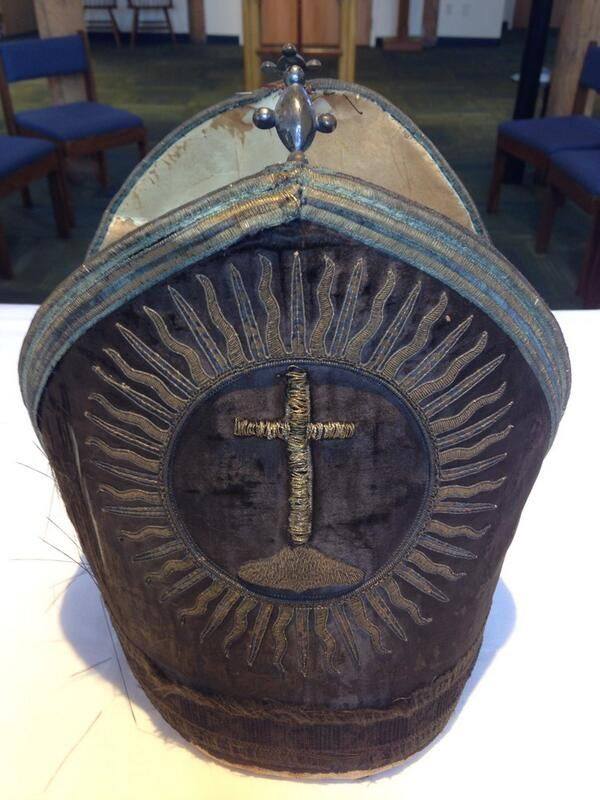Samuel Seabury's Miter
 Embryo Parson Posted on
Embryo Parson Posted on  Wednesday, November 14, 2018 at 11:23PM
Wednesday, November 14, 2018 at 11:23PM  H/T Bishop Chandler Holder Jones, Bishop Suffragan of the Diocese of the Eastern United States of the Anglican Province of America.
H/T Bishop Chandler Holder Jones, Bishop Suffragan of the Diocese of the Eastern United States of the Anglican Province of America.
14th November 1784, the Bestowal of the American Episcopate: ALMIGHTY God, who by thy Son Jesus Christ didst give to thy holy Apostles many excellent gifts, and didst charge them to feed thy flock; Give grace, we beseech thee, to all Bishops, the Pastors of thy Church, that they may diligently preach thy Word, and duly administer the godly Discipline thereof; and grant to the people, that they may obediently follow the same; that all may receive the crown of everlasting glory; through the same thy Son Jesus Christ our Lord. Amen.
My Anglican friends and brother clergy: don't allow ANYONE from the ranks of the Roman Catholic Church or the Eastern Orthodox Church to get away with the assertion that Anglican orders aren't valid. The scholars among them know otherwise.
One other note: Seabury's consecration by bishops of the Scottish Episcopal Church came with the mandate that the new American Book of Common Prayer would include in the Service of Holy Communion the Prayer of Consecration and Epiclesis from the Scottish Book of Common Prayer, an inheritance of the good and faithful Catholic work of the English Non-Jurors. That is why the 1928 American Book of Common Prayer is superior to the 1662 English book, its status as an official formulary of the Church of England notwithstanding.





Reader Comments (4)
I'd have to actually worship with the 1662 BCP Holy Communion service to know which one is better or not. However the presence of the Epiclesis doesn't mean the 1928 BCP, as a whole, suffers in other areas.
They are very similar in the essentials, but the lack of an Epiclesis, etc. constitute a huge stumbling block for Catholic-minded Anglicans.
I dunno, if it was alright for Pusey, Dearmer, and others it's alright for me.
Even the RCC lacked the Epiclesis for a thousand years.
And while the 1662 liturgy doesn't directly invoke the Holy Ghost it does require the priest to pray:
Hear us, O merciful Father, we most humbly beseech thee; and grant that we receiving these thy creatures of bread and wine, according to thy Son our Saviour Jesus Christ's holy institution, in remembrance of his death and passion, may be partakers of his most blessed Body and Blood:
While not directly calling for the Holy Ghost I think it closely resembles the Epiclesis in one of the earliest liturgies in the Apostolic Constitution (the invocation of the Holy Ghost being implied in the 1662):
we beseech Thee that Thou wilt mercifully look down upon these gifts which are here set before Thee, O Thou God, who standest in need of none of our offerings. And do Thou accept them, to the honour of Thy Christ, and send down upon this sacrifice Thine Holy Spirit, the Witness of the Lord Jesus' sufferings, that He may show this bread to be the body of Thy Christ, and the cup to be the blood of Thy Christ, that those who are partakers thereof may be strengthened for piety, may obtain the remission of their sins, may be delivered from the devil and his deceit, may be filled with the Holy Ghost, may be made worthy of Thy Christ, and may obtain eternal, life upon Thy reconciliation to them, O Lord Almighty.
Some, of course, translate the "show" as "make" but the Greek does seem to favor the former.
Finally, if the Directorium Anglicanum (an early Anglican Catholic manual for the celebration of the Holy Communion) finds no fault, why should I?
Directorium Anglicanum
I'm a little more concerned that in our small parish of 15 that unordained people (including myself) distribute the cup when assisting at the altar.
You make some fair points, Ken. Thanks.